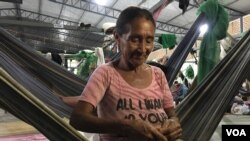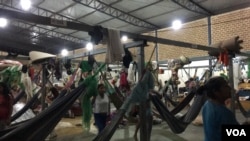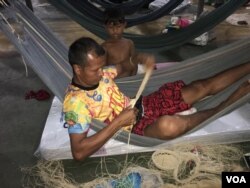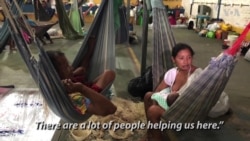Among the things that the Baudillo Centeno family brought from Tucupita (Venezuela) to Brazil is a big roll of a natural fiber called fique.
"I knew we were going to need it," said his mother, Maria Centeno, whose age is unknown even to her children.
Centeno and her family are Warao, members of an indigenous community that lives in the Orinoco Delta of Venezuela and in bordering countries such as Guyana and Trinidad and Tobago.
They use fiber extracted from the leaves of the fique to weave hammocks, hats and plates.
Since the Centeno family arrived in Boa Vista, a city in northeastern Brazil, their source of income is selling crafts, re-selling copper and asking for money on the street.
They are living in the Pintolândia shelter in Brazil.
Hundreds of hammocks
Six hundred 34 people from indigenous communities in Venezuela are living in the shelter provided by Brazil’s government and by non-governmental agencies like the UN refugee agency (UNHCR) and the Adventist Development and Relief Agency (ADRA).
The shelter is actually an adapted sports center. Hundreds of hammocks, provided by the NGOs, are hung in the open space for places for the refugees to sleep. There are also several tents where Venezuelan migrants live and rest. Every day at dusk, an area is adapted for children to play soccer.
The Waraos, a name that means "boat people," are one of the indigenous groups who have been forced to leave their territory due to the economic and political crisis in Venezuela. According to UNHCR, food shortages, unbridled inflation and violence are some of the factors that have pushed them to cross borders seeking humanitarian aid.
There are about 20,000 Warao in Venezuela.
Jesús Gutiérrez, chief of his Waraos tribe, says that the situation in Venezuela affects his people in a particularly crude way.
"Most of the Warao do not have a salary. We are farmers and artisans, but there is no one who buys [our products] in Venezuela," he said.
But not many in Brazil are buying either. The Centeno family say that their fique products are not selling well and most of the time, they have to beg for money on the street.
On occasion men have asked younger Centeno females for sex in exchange for money.
"The [men] arrive and show you the money. Once, a guy told me, you're so pretty, what are you asking for [money]?" said 19-year-old Erica Gonzales.
Missing home
Warao tribes are composed of several families. Gutiérrez's, for example, has 600 members, of which 75 are in Boa Vista. One of the particularities of the immigration of the indigenous groups, said Helena Souders, coordinator of ADRA, is that they usually travel in big family units.
In Pintolândia and in five other refugee camps in Boa Vista, ADRA provides migrants with hygiene, domestic and kitchen kits. In this particular settlement, explains Souders, they try to adapt to the needs of the indigenous people. For instance, they hand out hammocks instead of mattresses and they distribute uncooked food, so the refugees can prepare meals on charcoal fires.
However, both Gutiérrez and members of the Centeno family say that in Venezuela they slept on mattresses.
"Sleeping in hammocks was done before ... there are very few who still do it," said Erica Rodrígez, Centeno's granddaughter, who left her career as an agro-industrial engineer when she immigrated to Brazil.
Chief Gutiérrez says that sometimes problems arise in coexistence. "We are not used to sleeping like this, all together." He adds that what bothers him the most is having to keep an eye on his possessions, such as spoons and plates, so they do not get stolen.
However, he says, as hard as it is to adapt to living in a camp, to a certain extent he is better here than in Venezuela, where he struggled to find a way to feed his family.
Although grateful for the help he is receiving, Baudillo Centeno says that he feels locked up in the shelter.
WATCH: A peek inside the shelter
His mother, Maria Centeno, has a one-month old grandhchild, who was born in Boa Vista. She feels that the little one "does not live free." In Venezuela, says Centeno, "we lived more open and close to the river. We listened to the animals, as they sang. Here we only hear the cries of our babies.”
She says that she prays for the other Venezuelans who, like her, want to come to Boa Vista: "There is no room for more people".











